人教新目标版英语八年级上Unit 7 Will people have robots?重点单词和知识点梳理课件(36张PPT无素材)
文档属性
| 名称 | 人教新目标版英语八年级上Unit 7 Will people have robots?重点单词和知识点梳理课件(36张PPT无素材) | 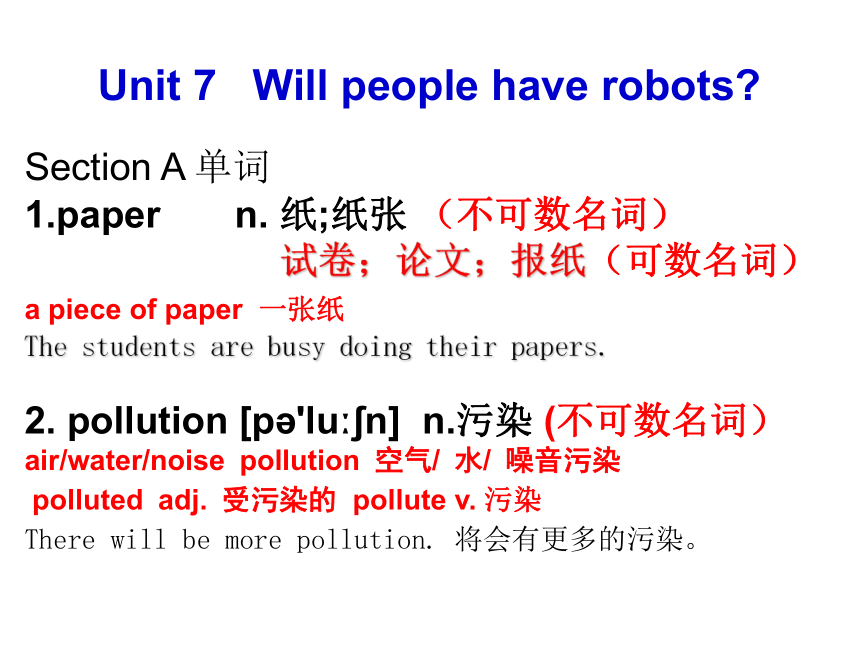 | |
| 格式 | ppt | ||
| 文件大小 | 808.5KB | ||
| 资源类型 | 教案 | ||
| 版本资源 | 人教新目标(Go for it)版 | ||
| 科目 | 英语 | ||
| 更新时间 | 2022-04-07 11:11:02 | ||
图片预览

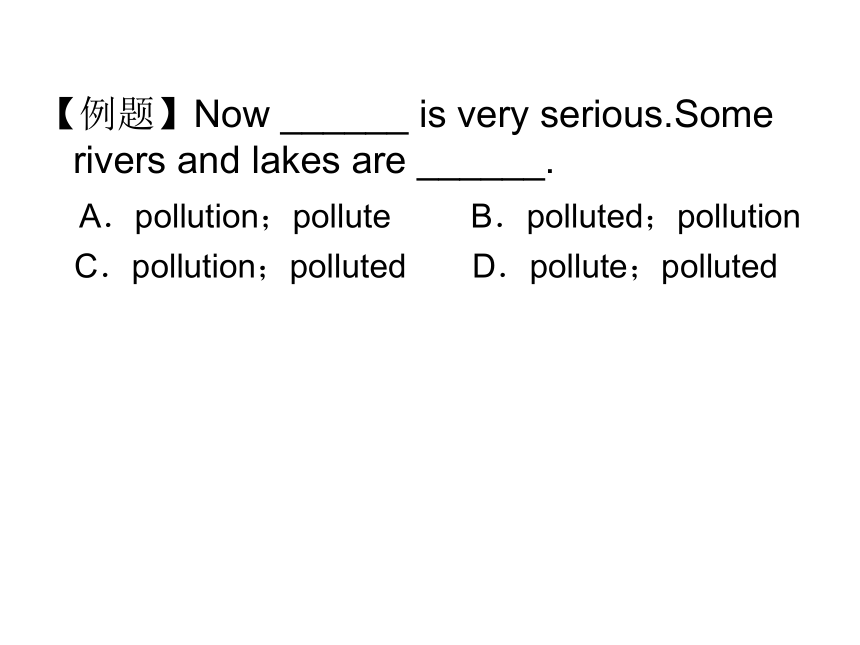
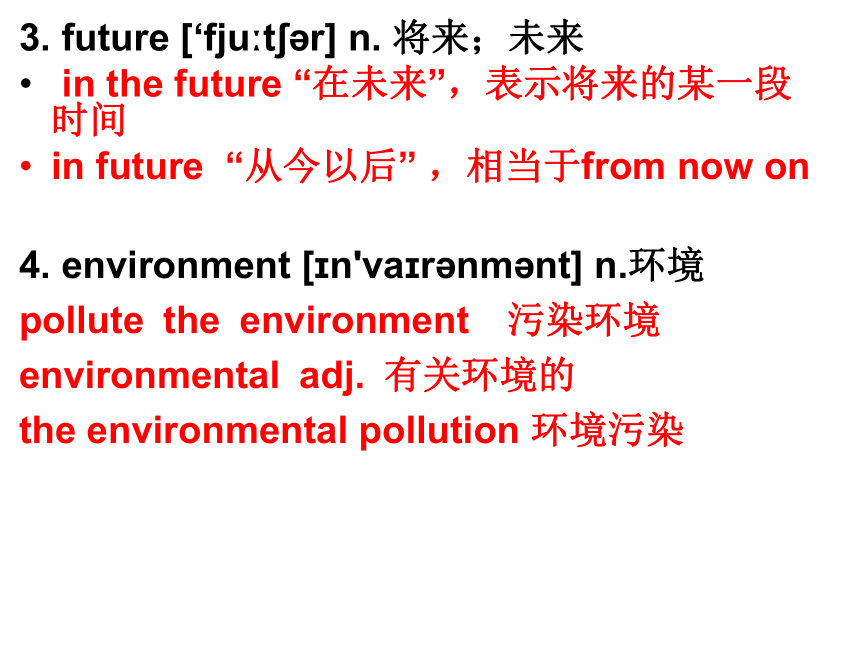
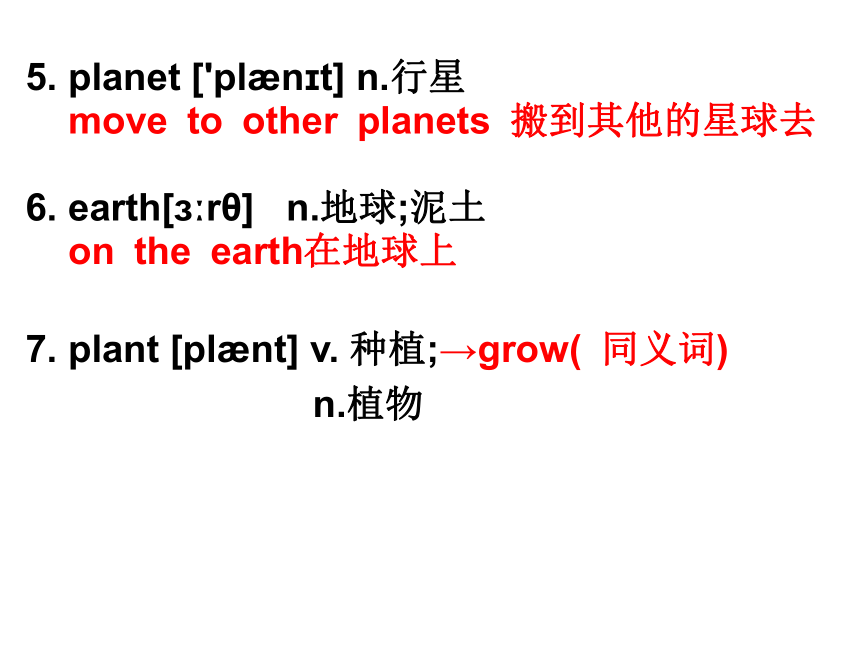
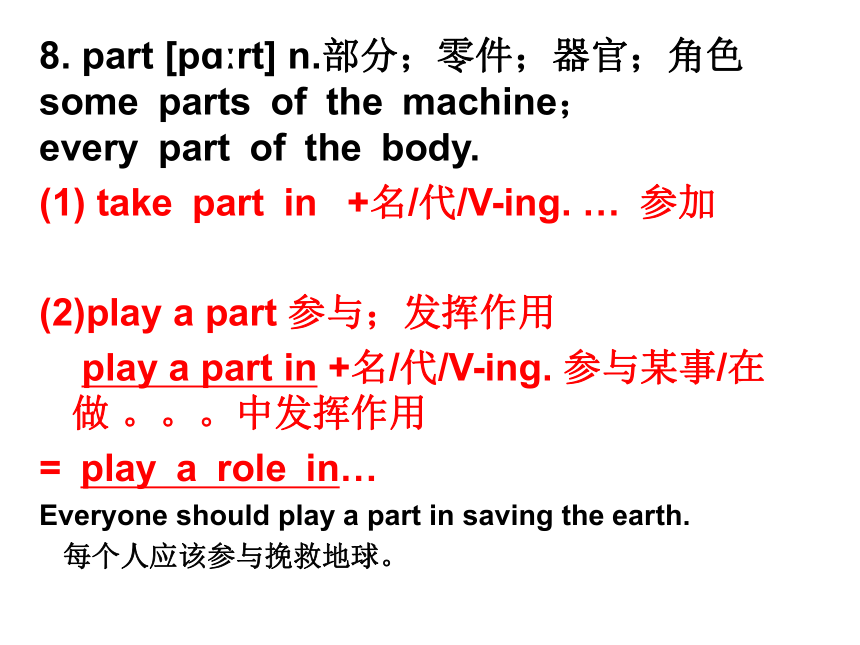
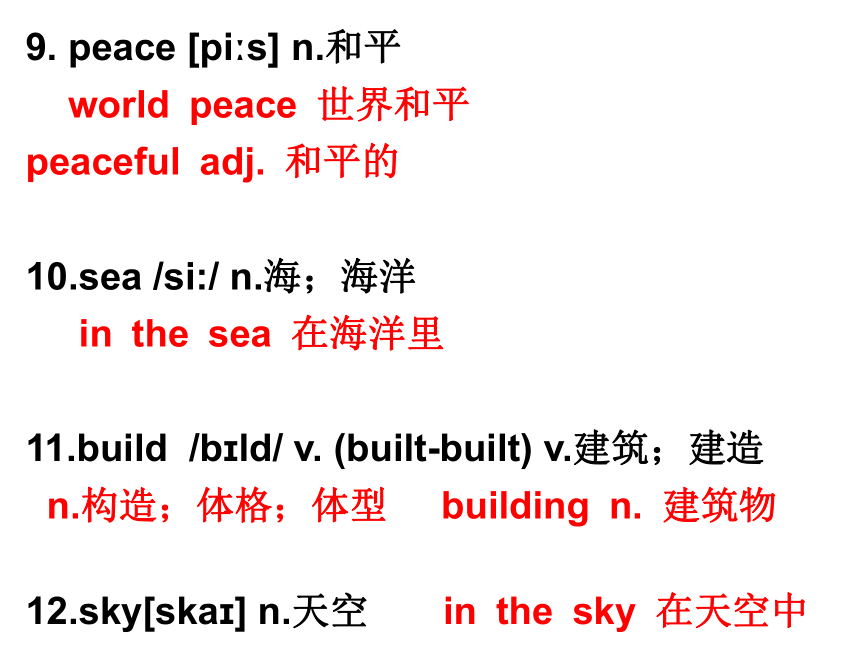
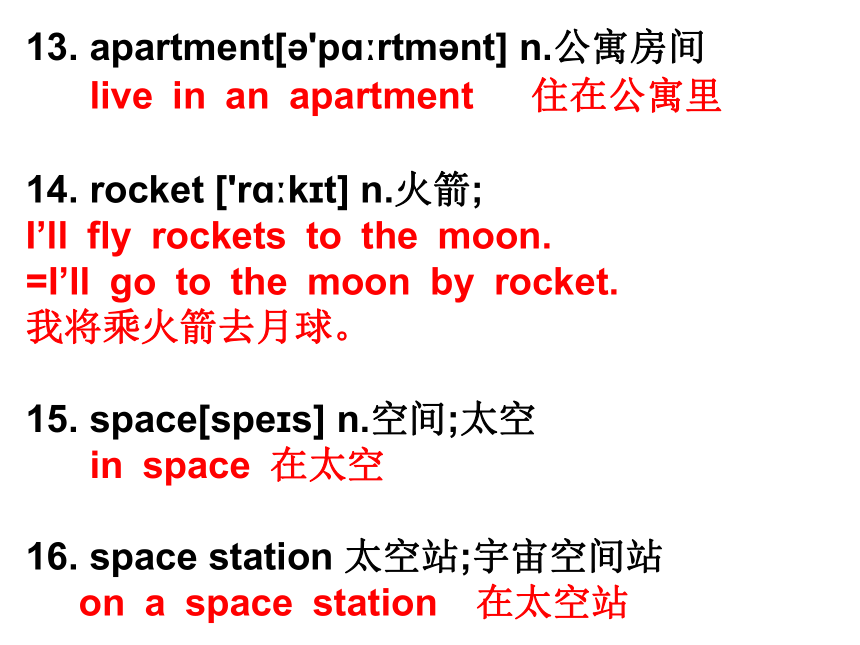
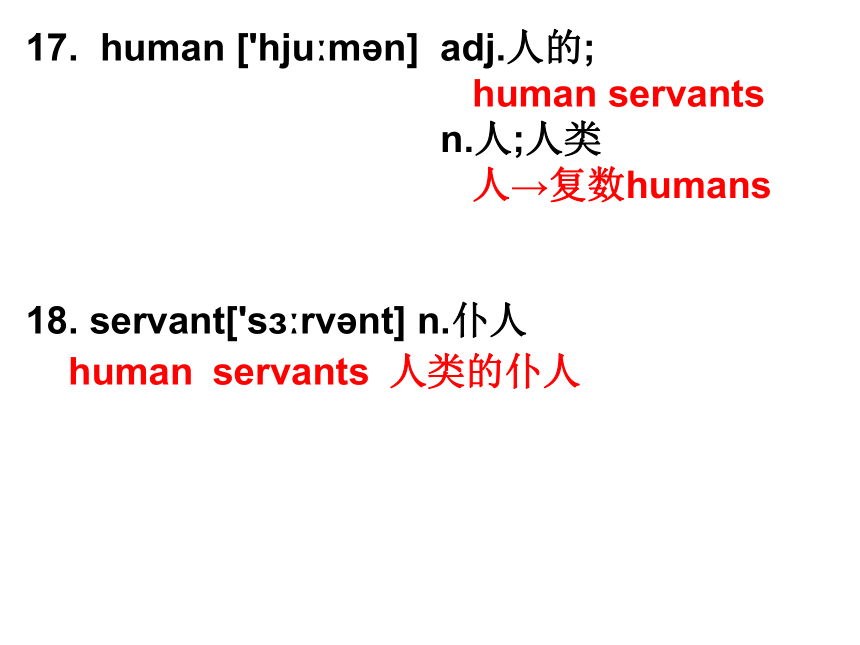
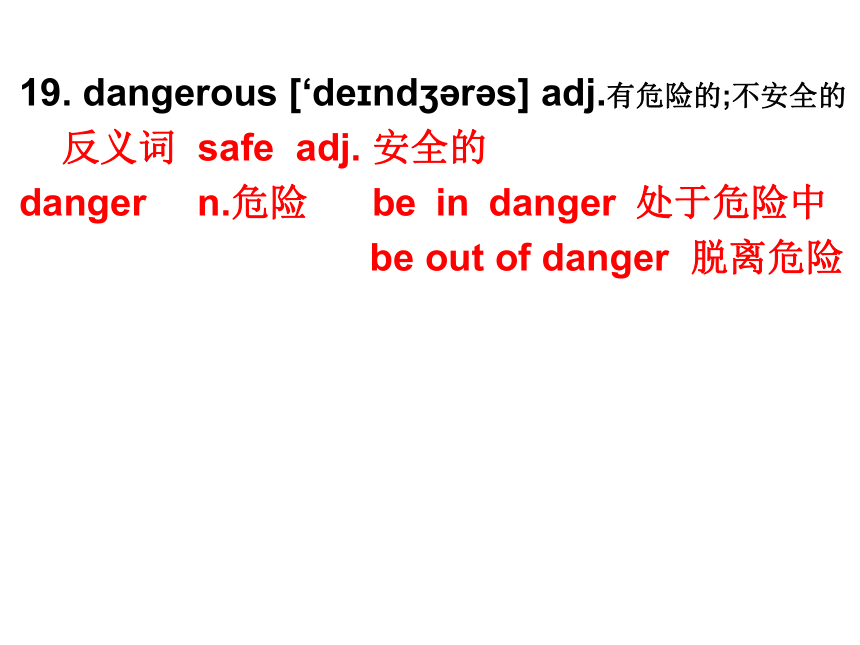
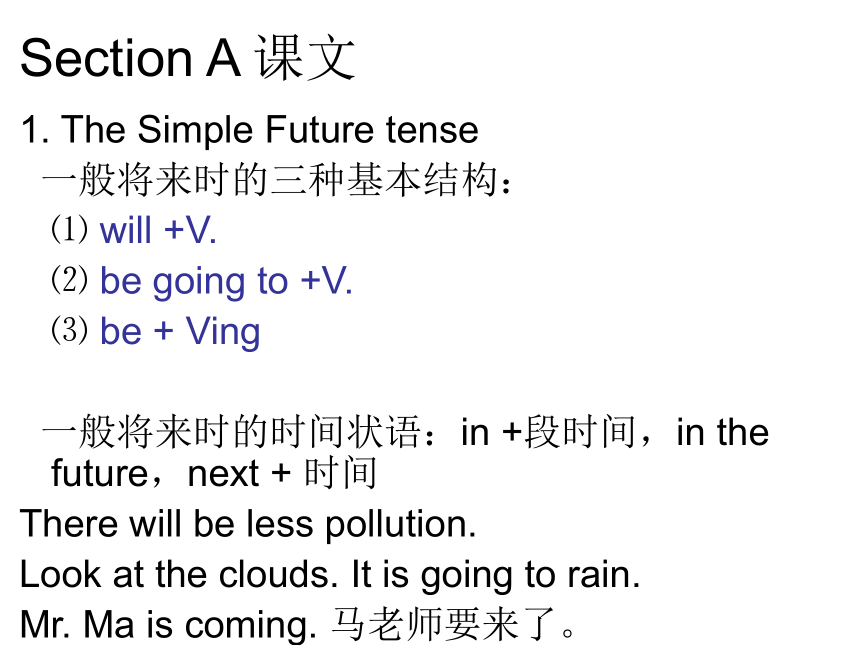
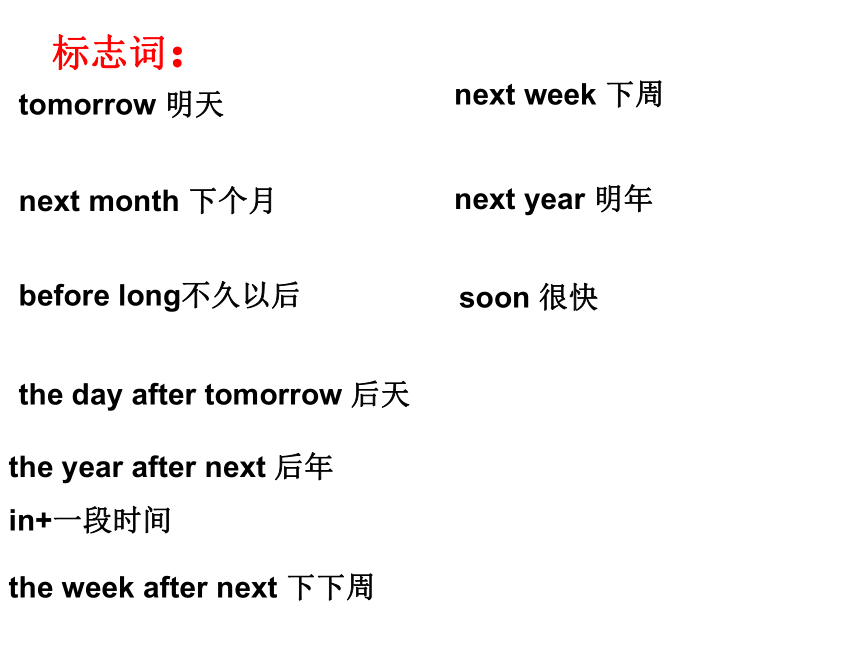
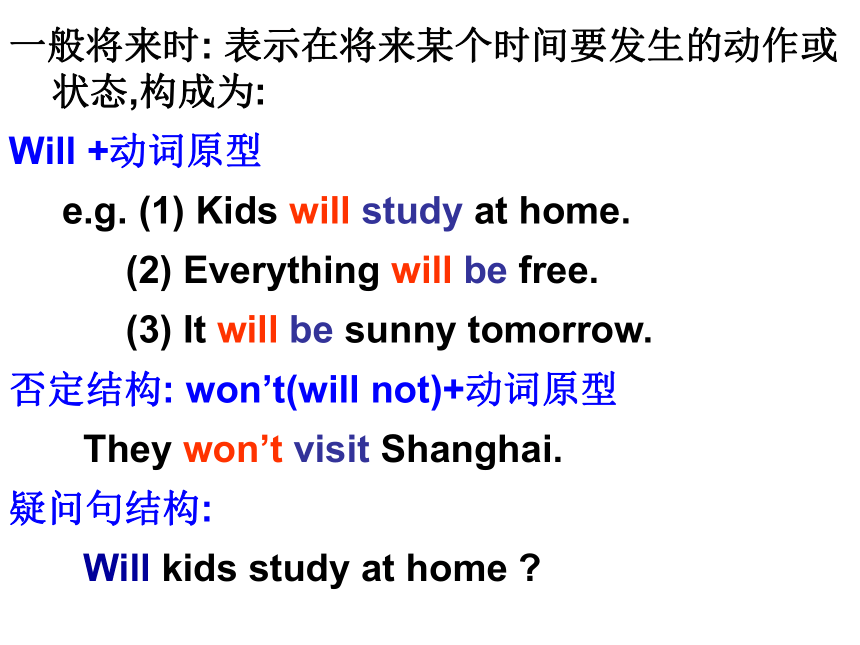
文档简介
(共36张PPT)
Unit 7 Will people have robots
Section A 单词
1.paper n. 纸;纸张 (不可数名词)
试卷;论文;报纸(可数名词)
a piece of paper 一张纸
The students are busy doing their papers.
2. pollution [p 'lu n] n.污染 (不可数名词)
air/water/noise pollution 空气/ 水/ 噪音污染
polluted adj. 受污染的 pollute v. 污染
There will be more pollution. 将会有更多的污染。
【例题】Now ______ is very serious.Some rivers and lakes are ______.
A.pollution;pollute B.polluted;pollution
C.pollution;polluted D.pollute;polluted
3. future [‘fju t r] n. 将来;未来
in the future “在未来”,表示将来的某一段时间
in future “从今以后” ,相当于from now on
4. environment [ n'va r nm nt] n.环境
pollute the environment 污染环境
environmental adj. 有关环境的
the environmental pollution 环境污染
5. planet ['pl n t] n.行星
move to other planets 搬到其他的星球去
6. earth[ rθ] n.地球;泥土
on the earth在地球上
7. plant [pl nt] v. 种植;→grow( 同义词)
n.植物
8. part [pɑ rt] n.部分;零件;器官;角色 some parts of the machine; every part of the body.
(1) take part in +名/代/V-ing. … 参加
(2)play a part 参与;发挥作用
play a part in +名/代/V-ing. 参与某事/在做 。。。中发挥作用
= play a role in…
Everyone should play a part in saving the earth.
每个人应该参与挽救地球。
9. peace [pi s] n.和平
world peace 世界和平
peaceful adj. 和平的
10.sea /si:/ n.海;海洋
in the sea 在海洋里
11.build /b ld/ v. (built-built) v.建筑;建造
n.构造;体格;体型 building n. 建筑物
12.sky[ska ] n.天空 in the sky 在天空中
13. apartment[ 'pɑ rtm nt] n.公寓房间
live in an apartment 住在公寓里
14. rocket ['rɑ k t] n.火箭;
I’ll fly rockets to the moon.
=I’ll go to the moon by rocket.
我将乘火箭去月球。
15. space[spe s] n.空间;太空
in space 在太空
16. space station 太空站;宇宙空间站
on a space station 在太空站
17. human ['hju m n] adj.人的;
human servants
n.人;人类
人→复数humans
18. servant['s rv nt] n.仆人
human servants 人类的仆人
19. dangerous [‘de nd r s] adj.有危险的;不安全的
反义词 safe adj. 安全的
danger n.危险 be in danger 处于危险中
be out of danger 脱离危险
Section A 课文
1. The Simple Future tense
一般将来时的三种基本结构:
⑴ will +V.
⑵ be going to +V.
⑶ be + Ving
一般将来时的时间状语:in +段时间,in the future,next + 时间
There will be less pollution.
Look at the clouds. It is going to rain.
Mr. Ma is coming. 马老师要来了。
标志词:
tomorrow 明天
the day after tomorrow 后天
next week 下周
next year 明年
next month 下个月
before long不久以后
soon 很快
the year after next 后年
in+一段时间
the week after next 下下周
一般将来时: 表示在将来某个时间要发生的动作或状态,构成为:
Will +动词原型
e.g. (1) Kids will study at home.
(2) Everything will be free.
(3) It will be sunny tomorrow.
否定结构: won’t(will not)+动词原型
They won’t visit Shanghai.
疑问句结构:
Will kids study at home
某些动词的进行时态表示将要发生的动作。
例如:
go, come, leave, meet, start, begin, finish…
Jack is waiting for a bus. He is going to the park.
My father is leaving for Shanghai tomorrow.
People are busy shopping. The shops are crowded.
Because the Spring Festival is coming.
Exercise
如果明天下雪,我们就不去那儿了。
We ____ ____ there if it ______ tomorrow.
她打算星期天再帮助 Tim 一次。
She ____ _____ Tim again on Sunday.
She ___ _____ ___ _____ Tim again on Sunday.
这个周末有一次会议。
There_____ ____ a meeting this weekend.
There ___ _______ ___ ____ a meeting this weekend.
如果你天天进行体育活动,你就会很健康。
You’ll be healthy if you ____ sports every day.
won’t go
snows
do
is going to help
will help
is going to be
will be
Exercise
1. Tom _____ Hongkong tomorrow.
A. visits B. will visit C. visited D. visit
B
2.There _____ a new bridge in Tanzhou in 2 years.
A. will be B. will have C. is D. was
A
2.Do you think there will be robots in people's homes
there will be意为“将有,会有”,是there be句型的一般将来式,其否定形式是there won't be...,一般疑问句形式是Will there be... 有时可以与There is/are going to be...相互转换。
e.g. There will be a film this evening.
否定句,疑问句,答语
拓展:
there be句型的一个重要用法是“就近一致”原则,即谓语动词be和最靠近它的名词在数上保持一致。
e.g. There is a book and two rulers on the desk.
There are two rulers and a book on the desk.
there be与have/has的区别:前者表示某地存在某物;后者表示“拥有”的意思。二者有时可以互换。
e.g. Our school has twenty classes.
=There are twenty classes in our class.
---Why are you in such a hurry, John
---There ____ a basketball match between Class Three and our class in ten minutes.
A. is going to be B. is going to have
C. will have D. will hold
A
3. I think every home will have a robot.
这是一个含有宾语从句的主从复合句,I think为主句,every home will have a robot 是宾语从句,用来表述自己的看法。
e.g. I think the boy will buy a few new books about English.
拓展:根据语法的惯例,I think/suppose/believe/expect/imagine 等后的宾语从句如果是否定句,要把否定转移到主句的动词上,这种现象称之为“否定转移”。
e.g. I don't think he can swim.
I don't think you can go there by bus.
思考:其反意疑问句的变法
4.Books will only be on computers,not on paper.
书只会在电脑上,而不会在纸上。
paper n. “纸,纸张”,是不可数名词。表示“一张纸”用a piece of paper,“两张纸”用two pieces of paper。
e.g. There is a piece of paper on the table.桌子上有一张纸。
paper n. “试卷”,作可数名词,有复数形式。
e.g. I lost a history paper. 我丢了一份历史试卷。
5.Will people use money in 100 years in 100 years意为“在100年以后”,其中in为介词,其后跟一段时间表示“......之后”,通常用于一般将来时,对其提问时须用how soon(多久)。
---How soon will your mother finish cooking dinner
---In an hour.
辨析:in 与after
in和after都表示“在......之后”,它们的用法见下表:
e.g. He will be back in two days.
He started on Sunday and arrived in Beijing after three days.
in 用来表示以现在为起点的将来某一段时间之后,后接时间段 用于将来时
after 既可接时间点
又可接时间段 用于过去时
6. fewer,less和more
(1)fewer 较少的;更少的,few的比较级), 修饰可数名词的复数。
e.g. My friend has fewer apples than I.
我朋友比我的苹果少。
(2)less较少的;更少的,little的比较级,修饰不可数名词。
e.g. I have less money in my bag.
我包里的钱更少了。
(3)more更多的,many和much的比较级,可修饰可数名词,也可修饰不可数名词。
e.g. There is more water in the bottle.
瓶子里的水更多了。
e.g. We have more challenges.
我们有更多的挑战。
【例1】—Will there ______ any paper money in 100 years
—No,______.
A.have;there won't B.be;there won't
C.have;they won't D.be;they won't
【例2】We'll try our best to do the work with ______money and ______ people.
A.few;little B.a few;a little
C.less;fewer D.fewer;less
【例3】根据汉语意思完成下句
我想要更多水、更少的食物。
I would like ______ water and ______ food.
7. I don't think so.
I don't think so.是英语口语中常用的一个短句,表示否定对方的意见或观点,意为“我不这样认为”,其肯定形式为I think so.。
e.g. ---Look at the clouds. It will be rainy soon.
---I don't think so. I think it will be sunny soon.
拓展:类似的结构还有:
I hope so.(我希望是这样的)
I hope not. (我希望不是这样)
I'm afraid so. (恐怕如此)
I'm afraid not.(恐怕不是)
8. So what will the future be like
What's...like 为固定句式,意为“......怎么样?”其中,like是介词,意为“像,相似”。
e.g. What's the weather like today
拓展:What's sb. like 某人怎么样?(常用于询问某人的相貌、性格、品质)
e.g. ---What's Tom like ---He is funny.
---What's your father like ---He is tall and thin.
9.There will be fewer trees and the environment will be in great danger.
in danger意为“处于险境,在危险中”,其反义词为out of danger,意为“脱险”。
e.g. Some animals are out of danger.
拓展:danger的形容词是dangerous,意为“危险的”。
e.g. It's very dangerous to play on the road.
10.Everyone should play a part in saving the earth.
play a part 参与(某事),常用短语为:
play a part in...参与到……中,in是介词,后接名词、代词或动词 ing形式
。
e.g. Let's play a part in the discussion.
我们参与到讨论中吧。
e.g. Children are playing a part in cleaning the classroom.
孩子们正参与打扫教室。
Section B 单词
1. Japan /d ‘pe n/ 日本
Japanese adj./n. 日本的;日本人的/ 日本人 (复数不变仍是Japanese)
2. believe [b 'li v] v. 相信;认为有可能
1) believe sb. 相信某人的话
2).believe in sth. 信任某人;相信(…的存在) Do you believe in God
3). believe it or not. 信不信由你; I believe so. 我这样认为;
I believe not. 我不这样认为。
3. disagree [ d s 'ɡri ]不同意
disagree with sb.不同意某人的看法
disagree to do sth不同意做某事
→反义词 agree
4.agree / ‘gri:/ v. 同意;赞成;应允
(1)agree with意为“同意…;赞成…”,后面接人或表示“意见;观点”的词。
She agreed with me. 她同意我的意见。
I quite agree with what you said. 我完全同意你说的话
(2)agree to do sth 同意做某事
(3)agree还可以用于that从句前,表示“同意;一致认为”。
We all agreed that it was a good plan.
我们一致认为这是一项好计划。
【例题】There are ______of students in our school but only ______ of them are girls.
A.hundreds;two hundred
B.hundred;two hundreds
C.hundreds;two hundreds
D.hundred;two hundred
(v) 2.(价格、温度、声音等)下降
The temperature fell to below 00C.
3. 变为(状态),是连系动词。
fall asleep 入睡 fall ill 生病
短语:
fall down 突然倒下;跌倒;倒塌
fall down from sp = fall off
8. look for 寻找;寻求 (表动作)
find找到 (表结果)
find out 找到;查明;发现
9. possible [‘p s bl] adj.可能的;副词possibly
(1)as...as possible 尽可能… =as...as one can
as soon as possible 尽可能快(指时间)as fast as possible 尽可能快(指速度)
as quickly as possible 尽可能快(指动作)
as early as possible 尽可能早(指时间)
(2)if possible 如果可能的话
e.g. If possible, I want to go to the USA for study.
反义词:impossible adj.不可能的; seem impossible 似乎不可能
10. probably ['prɑ b bli] 大概;或许;很可能
perhaps/maybe/ possibly ( 同义词)
11.word [w rd] n.(1)单词;词 (2)话
word by word 逐字地
the meaning(s) of words 单词的意思
have a word with sb. 和某人说话
SectionB课文
1.Today there are already robots working in factories.现在已经有机器人在工厂里工作了。
本句含有固定句型:There is/are+sb./sth.+doing sth.表示“有某人/某物在做某事”。
e.g. There are some boys swimming in the swimming pool.
有一些男孩在游泳池里游泳。
e.g. There is a bag lying on the ground.
有一个包躺在地上。
Unit 7 Will people have robots
Section A 单词
1.paper n. 纸;纸张 (不可数名词)
试卷;论文;报纸(可数名词)
a piece of paper 一张纸
The students are busy doing their papers.
2. pollution [p 'lu n] n.污染 (不可数名词)
air/water/noise pollution 空气/ 水/ 噪音污染
polluted adj. 受污染的 pollute v. 污染
There will be more pollution. 将会有更多的污染。
【例题】Now ______ is very serious.Some rivers and lakes are ______.
A.pollution;pollute B.polluted;pollution
C.pollution;polluted D.pollute;polluted
3. future [‘fju t r] n. 将来;未来
in the future “在未来”,表示将来的某一段时间
in future “从今以后” ,相当于from now on
4. environment [ n'va r nm nt] n.环境
pollute the environment 污染环境
environmental adj. 有关环境的
the environmental pollution 环境污染
5. planet ['pl n t] n.行星
move to other planets 搬到其他的星球去
6. earth[ rθ] n.地球;泥土
on the earth在地球上
7. plant [pl nt] v. 种植;→grow( 同义词)
n.植物
8. part [pɑ rt] n.部分;零件;器官;角色 some parts of the machine; every part of the body.
(1) take part in +名/代/V-ing. … 参加
(2)play a part 参与;发挥作用
play a part in +名/代/V-ing. 参与某事/在做 。。。中发挥作用
= play a role in…
Everyone should play a part in saving the earth.
每个人应该参与挽救地球。
9. peace [pi s] n.和平
world peace 世界和平
peaceful adj. 和平的
10.sea /si:/ n.海;海洋
in the sea 在海洋里
11.build /b ld/ v. (built-built) v.建筑;建造
n.构造;体格;体型 building n. 建筑物
12.sky[ska ] n.天空 in the sky 在天空中
13. apartment[ 'pɑ rtm nt] n.公寓房间
live in an apartment 住在公寓里
14. rocket ['rɑ k t] n.火箭;
I’ll fly rockets to the moon.
=I’ll go to the moon by rocket.
我将乘火箭去月球。
15. space[spe s] n.空间;太空
in space 在太空
16. space station 太空站;宇宙空间站
on a space station 在太空站
17. human ['hju m n] adj.人的;
human servants
n.人;人类
人→复数humans
18. servant['s rv nt] n.仆人
human servants 人类的仆人
19. dangerous [‘de nd r s] adj.有危险的;不安全的
反义词 safe adj. 安全的
danger n.危险 be in danger 处于危险中
be out of danger 脱离危险
Section A 课文
1. The Simple Future tense
一般将来时的三种基本结构:
⑴ will +V.
⑵ be going to +V.
⑶ be + Ving
一般将来时的时间状语:in +段时间,in the future,next + 时间
There will be less pollution.
Look at the clouds. It is going to rain.
Mr. Ma is coming. 马老师要来了。
标志词:
tomorrow 明天
the day after tomorrow 后天
next week 下周
next year 明年
next month 下个月
before long不久以后
soon 很快
the year after next 后年
in+一段时间
the week after next 下下周
一般将来时: 表示在将来某个时间要发生的动作或状态,构成为:
Will +动词原型
e.g. (1) Kids will study at home.
(2) Everything will be free.
(3) It will be sunny tomorrow.
否定结构: won’t(will not)+动词原型
They won’t visit Shanghai.
疑问句结构:
Will kids study at home
某些动词的进行时态表示将要发生的动作。
例如:
go, come, leave, meet, start, begin, finish…
Jack is waiting for a bus. He is going to the park.
My father is leaving for Shanghai tomorrow.
People are busy shopping. The shops are crowded.
Because the Spring Festival is coming.
Exercise
如果明天下雪,我们就不去那儿了。
We ____ ____ there if it ______ tomorrow.
她打算星期天再帮助 Tim 一次。
She ____ _____ Tim again on Sunday.
She ___ _____ ___ _____ Tim again on Sunday.
这个周末有一次会议。
There_____ ____ a meeting this weekend.
There ___ _______ ___ ____ a meeting this weekend.
如果你天天进行体育活动,你就会很健康。
You’ll be healthy if you ____ sports every day.
won’t go
snows
do
is going to help
will help
is going to be
will be
Exercise
1. Tom _____ Hongkong tomorrow.
A. visits B. will visit C. visited D. visit
B
2.There _____ a new bridge in Tanzhou in 2 years.
A. will be B. will have C. is D. was
A
2.Do you think there will be robots in people's homes
there will be意为“将有,会有”,是there be句型的一般将来式,其否定形式是there won't be...,一般疑问句形式是Will there be... 有时可以与There is/are going to be...相互转换。
e.g. There will be a film this evening.
否定句,疑问句,答语
拓展:
there be句型的一个重要用法是“就近一致”原则,即谓语动词be和最靠近它的名词在数上保持一致。
e.g. There is a book and two rulers on the desk.
There are two rulers and a book on the desk.
there be与have/has的区别:前者表示某地存在某物;后者表示“拥有”的意思。二者有时可以互换。
e.g. Our school has twenty classes.
=There are twenty classes in our class.
---Why are you in such a hurry, John
---There ____ a basketball match between Class Three and our class in ten minutes.
A. is going to be B. is going to have
C. will have D. will hold
A
3. I think every home will have a robot.
这是一个含有宾语从句的主从复合句,I think为主句,every home will have a robot 是宾语从句,用来表述自己的看法。
e.g. I think the boy will buy a few new books about English.
拓展:根据语法的惯例,I think/suppose/believe/expect/imagine 等后的宾语从句如果是否定句,要把否定转移到主句的动词上,这种现象称之为“否定转移”。
e.g. I don't think he can swim.
I don't think you can go there by bus.
思考:其反意疑问句的变法
4.Books will only be on computers,not on paper.
书只会在电脑上,而不会在纸上。
paper n. “纸,纸张”,是不可数名词。表示“一张纸”用a piece of paper,“两张纸”用two pieces of paper。
e.g. There is a piece of paper on the table.桌子上有一张纸。
paper n. “试卷”,作可数名词,有复数形式。
e.g. I lost a history paper. 我丢了一份历史试卷。
5.Will people use money in 100 years in 100 years意为“在100年以后”,其中in为介词,其后跟一段时间表示“......之后”,通常用于一般将来时,对其提问时须用how soon(多久)。
---How soon will your mother finish cooking dinner
---In an hour.
辨析:in 与after
in和after都表示“在......之后”,它们的用法见下表:
e.g. He will be back in two days.
He started on Sunday and arrived in Beijing after three days.
in 用来表示以现在为起点的将来某一段时间之后,后接时间段 用于将来时
after 既可接时间点
又可接时间段 用于过去时
6. fewer,less和more
(1)fewer 较少的;更少的,few的比较级), 修饰可数名词的复数。
e.g. My friend has fewer apples than I.
我朋友比我的苹果少。
(2)less较少的;更少的,little的比较级,修饰不可数名词。
e.g. I have less money in my bag.
我包里的钱更少了。
(3)more更多的,many和much的比较级,可修饰可数名词,也可修饰不可数名词。
e.g. There is more water in the bottle.
瓶子里的水更多了。
e.g. We have more challenges.
我们有更多的挑战。
【例1】—Will there ______ any paper money in 100 years
—No,______.
A.have;there won't B.be;there won't
C.have;they won't D.be;they won't
【例2】We'll try our best to do the work with ______money and ______ people.
A.few;little B.a few;a little
C.less;fewer D.fewer;less
【例3】根据汉语意思完成下句
我想要更多水、更少的食物。
I would like ______ water and ______ food.
7. I don't think so.
I don't think so.是英语口语中常用的一个短句,表示否定对方的意见或观点,意为“我不这样认为”,其肯定形式为I think so.。
e.g. ---Look at the clouds. It will be rainy soon.
---I don't think so. I think it will be sunny soon.
拓展:类似的结构还有:
I hope so.(我希望是这样的)
I hope not. (我希望不是这样)
I'm afraid so. (恐怕如此)
I'm afraid not.(恐怕不是)
8. So what will the future be like
What's...like 为固定句式,意为“......怎么样?”其中,like是介词,意为“像,相似”。
e.g. What's the weather like today
拓展:What's sb. like 某人怎么样?(常用于询问某人的相貌、性格、品质)
e.g. ---What's Tom like ---He is funny.
---What's your father like ---He is tall and thin.
9.There will be fewer trees and the environment will be in great danger.
in danger意为“处于险境,在危险中”,其反义词为out of danger,意为“脱险”。
e.g. Some animals are out of danger.
拓展:danger的形容词是dangerous,意为“危险的”。
e.g. It's very dangerous to play on the road.
10.Everyone should play a part in saving the earth.
play a part 参与(某事),常用短语为:
play a part in...参与到……中,in是介词,后接名词、代词或动词 ing形式
。
e.g. Let's play a part in the discussion.
我们参与到讨论中吧。
e.g. Children are playing a part in cleaning the classroom.
孩子们正参与打扫教室。
Section B 单词
1. Japan /d ‘pe n/ 日本
Japanese adj./n. 日本的;日本人的/ 日本人 (复数不变仍是Japanese)
2. believe [b 'li v] v. 相信;认为有可能
1) believe sb. 相信某人的话
2).believe in sth. 信任某人;相信(…的存在) Do you believe in God
3). believe it or not. 信不信由你; I believe so. 我这样认为;
I believe not. 我不这样认为。
3. disagree [ d s 'ɡri ]不同意
disagree with sb.不同意某人的看法
disagree to do sth不同意做某事
→反义词 agree
4.agree / ‘gri:/ v. 同意;赞成;应允
(1)agree with意为“同意…;赞成…”,后面接人或表示“意见;观点”的词。
She agreed with me. 她同意我的意见。
I quite agree with what you said. 我完全同意你说的话
(2)agree to do sth 同意做某事
(3)agree还可以用于that从句前,表示“同意;一致认为”。
We all agreed that it was a good plan.
我们一致认为这是一项好计划。
【例题】There are ______of students in our school but only ______ of them are girls.
A.hundreds;two hundred
B.hundred;two hundreds
C.hundreds;two hundreds
D.hundred;two hundred
(v) 2.(价格、温度、声音等)下降
The temperature fell to below 00C.
3. 变为(状态),是连系动词。
fall asleep 入睡 fall ill 生病
短语:
fall down 突然倒下;跌倒;倒塌
fall down from sp = fall off
8. look for 寻找;寻求 (表动作)
find找到 (表结果)
find out 找到;查明;发现
9. possible [‘p s bl] adj.可能的;副词possibly
(1)as...as possible 尽可能… =as...as one can
as soon as possible 尽可能快(指时间)as fast as possible 尽可能快(指速度)
as quickly as possible 尽可能快(指动作)
as early as possible 尽可能早(指时间)
(2)if possible 如果可能的话
e.g. If possible, I want to go to the USA for study.
反义词:impossible adj.不可能的; seem impossible 似乎不可能
10. probably ['prɑ b bli] 大概;或许;很可能
perhaps/maybe/ possibly ( 同义词)
11.word [w rd] n.(1)单词;词 (2)话
word by word 逐字地
the meaning(s) of words 单词的意思
have a word with sb. 和某人说话
SectionB课文
1.Today there are already robots working in factories.现在已经有机器人在工厂里工作了。
本句含有固定句型:There is/are+sb./sth.+doing sth.表示“有某人/某物在做某事”。
e.g. There are some boys swimming in the swimming pool.
有一些男孩在游泳池里游泳。
e.g. There is a bag lying on the ground.
有一个包躺在地上。
同课章节目录
- Unit 1 Where did you go on vacation?
- Section A
- Section B
- Unit 2 How often do you exercise?
- Section A
- Section B
- Unit 3 I'm more outgoing than my sister.
- Section A
- Section B
- Unit 4 What's the best movie theater?
- Section A
- Section B
- Unit 5 Do you want to watch a game show?
- Section A
- Section B
- Unit 6 I'm going to study computer science.
- Section A
- Section B
- Unit 7 Will people have robots?
- Section A
- Section B
- Unit 8 How do you make a banana milk shake?
- Section A
- Section B
- Unit 9 Can you come to my party?
- Section A
- Section B
- Unit 10 If you go to the party, you'll have a grea
- Section A
- Section B
